Learning to Live Again Ken Menard
I homo's 10-year experiment to record every moment
(Epitome credit:
Eduardo Cano
)
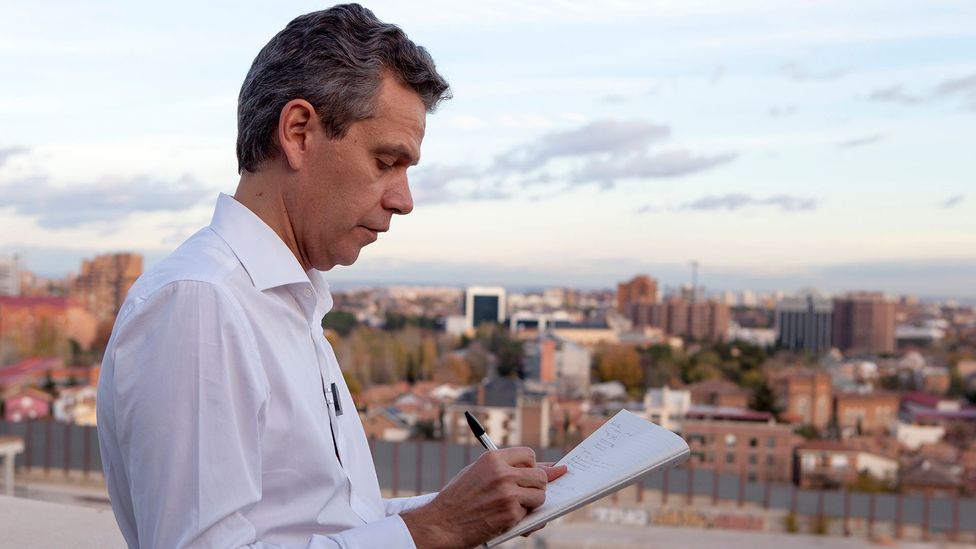
A Spanish scientist records all his activities so he tin can learn how to alive more effectively. But what do you lot gain from forensically tracking every function of your twenty-four hour period?
I
In February 2010, Morris Villarroel started an aggressive 10-year experiment.
The scientist, based at the Polytechnic University of Madrid, had just turned 40, and like many people after a milestone birthday, began to accept stock of his life. Wouldn't it be useful to accept a more complete and physical record of his life, he thought? Not merely would it help him to remember more than of his by; it might too help him effigy out how to live the rest of his life more effectively, and to make the virtually of his time.
And so he started to go along detailed log books of his every move. Each day'south entry begins the nighttime before, when he will make a plan for the mean solar day alee. On the day itself, he makes notes every 15 minutes to one-half an hour detailing where he is and what he'due south doing – whether that is a simple metro journeying, a grade at his university or an interview with a announcer, similar me.
"I'll write downward now that I'k speaking to you. And and then, more or less how much time that took and some of the questions you're asking," he says at the beginning of our conversation. He'll then review those notes later, he says, "if I have a moment where I'm waiting in a line up in a supermarket or if I accept to await for a doctor'due south appointment or a coming together or a telephone call".
Once the notebook is filled upwards, he'll carefully index its contents in Microsoft Excel and motion on to the next one.
Socrates argued that the "unexamined life is non worth living" – and few take examined their lives equally much equally Villarroel. He is role of a growing community of "cocky-trackers" who meticulously collect data on their lives in the pursuit of greater cocky-knowledge.
He's now 9 years and nine months – and 307 notebooks – into his 10-yr experiment. What has he learned? And would it be wise for us all to take a leaf out of his log books?
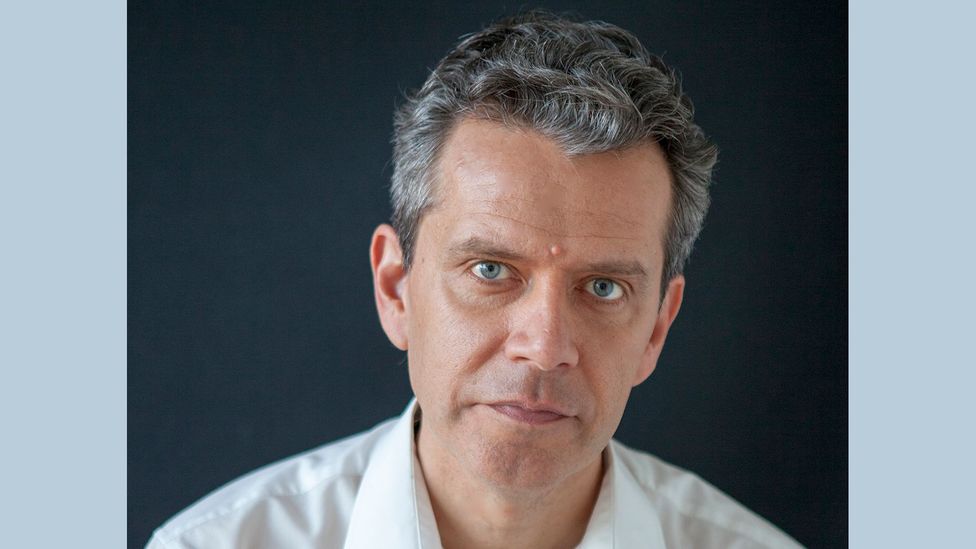
Villarroel says the meticulous notes he keeps makes information technology feel as if he has lived a longer life (Credit: Eduardo Cano)
When he first fix out on this project, one of Villarroel's primary goals was fourth dimension direction: to better understand how he was spending fourth dimension, and the furnishings of those activities on his health and happiness.
He used to drive to work, for example, only once he started keeping his log books, he noticed that he would get upset past small incidents similar someone cutting in front of him, which caused stress that would linger throughout the day. "Now I take the metro and walk to work – and that also ends up being better for my back," he says. Such small improvements may not seem revolutionary, merely together they accept improved his overall life satisfaction. "The good things slowly take over the more negative things."
The log books have similarly helped him to larn improve from experiences at piece of work, such as giving classes or briefing talks. "You can come across all the little details and how to improve them," he says. Without his records, those ideas would have been forgotten. And with the information entered into the spreadsheet, he can keep rail of how long he's spending on dissimilar projects and adjust his priorities accordingly. In tutorials with students, meanwhile, his detailed notes mean that he is improve able to remember their previous conversations and tailor the discussions to accommodate their personal needs.
More generally, Villarroel says that the log books accept helped to ameliorate his emotional regulation, so he'southward at present less reactive in stressful situations. "I think: 'Well, this has happened in the past and I've seen it all these unlike times, so now I can control myself a fleck improve,'" he says. In a fashion, he adds, the procedure of self-reflection helps you take a third-person perspective on events – as if you are a exterior observer – so you lot see a state of affairs more dispassionately.
As he'd hoped, he also appreciates having a more consummate record of his life, compared to his vaguer recollections of the past. "I can go through and really wait at the details of every twenty-four hours and almost every hour of every day over those 10 years," he says. "Whereas if I look from 30 to xl, I know lots of things happened, but I tin can't get [into] the granular details almost what was happening."
The sheer density of that record creates the impression of time dilation, he says – equally if he has lived a longer life. "I have the impression that these 10 years from 40 to fifty have gone slower," he says.
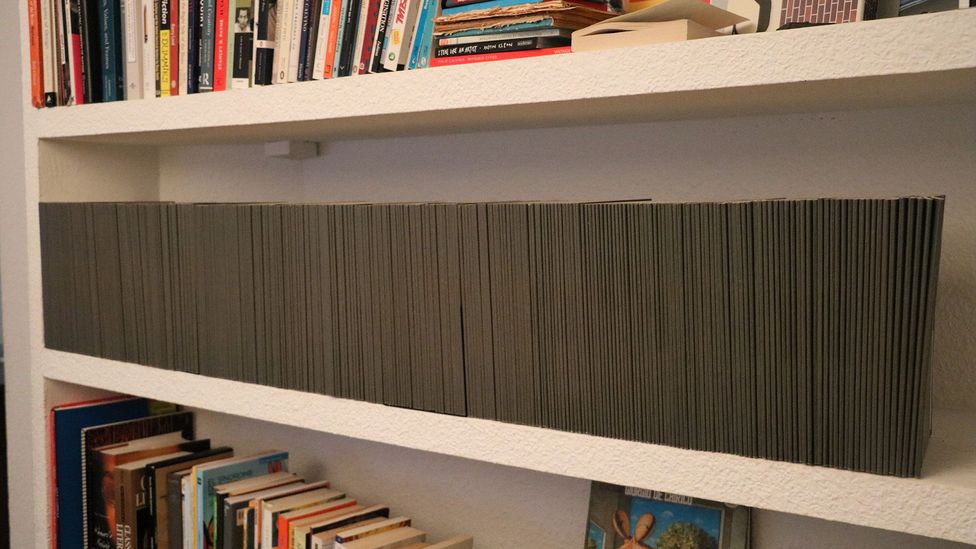
Villaroel spends about an hour a day recording his experiences – a practice that has filled 307 notebooks over x years (Credit: Morris Villarroel)
Villarroel's observations are shared by many other 'self-trackers', who use various strategies to record and analyse their life experiences. Many of them depict this as the 'Quantified Self' – with the aim of using data to know themselves ameliorate.
Consider 36-year-old James Norris, for instance, the founder of the social enterprise Upgradable who is now based in Bali, Indonesia. He began recording life events at the historic period of 16, with his beginning kiss: he wanted to make certain he could think the event for posterity. Since then, he has made a point of noting down any "first" in his life – any fourth dimension he's been to a new place, or eaten a new food (well-nigh recently, a charcoal burger), or tried any new experience (like skydiving). He'due south now counted i,850 of these events in total. He as well regularly tracks things like his productivity, his predictions for the future and his errors. The records are stored in an hands searchable reckoner database. "Every time I desire to get back and think something, I can just go and wait for a certain year or keyword, and and then I can recollect and experience it."
Like Villarroel, he thinks this helps to guide him on the best ways to spend his fourth dimension. Existence able to recall and so many first-time experiences is besides good for his conviction, he says – and makes him braver when he has to venture outside his comfort zone. It can also provide a mood boost when he'southward feeling downward. "If you remember the skilful things, y'all can savour information technology more and that's good for your wellbeing," he says. And this creates the impression of having lived longer and more than intensely. "Information technology's an easy, inexpensive way of just getting more value out of life."
Although few scientists have studied this kind of dedicated self-tracking, in that location is adept show that daily journaling can bring benefits. A study by Francesca Gino at Harvard Business School, for example, looked at a group of call centre employees undergoing technical training. She found that spending just ten minutes a day writing a periodical on the day's activities boosted their functioning past more than xx%. Outside piece of work, at that place is besides ample prove that writing and reflecting in a journal tin can boost your life satisfaction and happiness. Villarroel and Norris's experiences would certainly fit those patterns.
So while many of u.s.a. may struggle to keep such detailed records of our lives, most psychologists would concord that even a few minutes spent on self-reflection can pay large dividends – fifty-fifty if that only ways recognising some of the more mundane everyday pleasures that brand life a fiddling more enjoyable.
If keeping a written periodical doesn't appeal, in that location are alternative ways of self-tracking. You tin can now buy portable "lifelogging" cameras that have photos every xxx seconds or then throughout the day, for instance. These devices are sometimes given to people with dementia, but people accept as well adopted them to keep runway of their own lives.
Many of these users claim that the photos act equally a memory aid, with certain pictures prompting bright "Proustian moments" – named later the French novelist Marcel Proust's detailed recollections evoked by the taste of a madeleine. "A lot of details start flooding back," says Ali Mair, a psychologist at the Academy of Hertfordshire, "that all come together and give this very rich retentivity, and information technology just seems to come up out of nowhere." It seems that somehow the images, caught on the fly, deed as a special psychological trigger that volition bring about the details of events, in full.
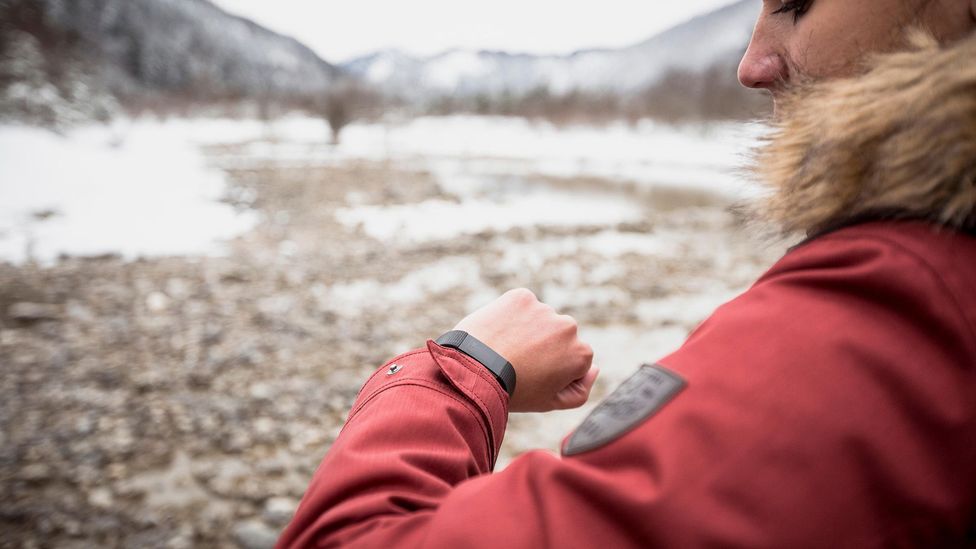
Lifeloggers who rails their deportment in photos could ane day combine this catalogue with other data – say, fitness tracking – to get a improve moving picture of their lives (Credit: Alamy)
Mair emphasises that this is mostly anecdotal show, though, and while some research would seem to support these stories, we demand much more scientific show earlier they could be recommended as a memory boost.
The hope is that ane day, image processing software volition be advanced enough to automatically catalogue these pictures and draw out the nigh salient features, which could allow you to go along rails of things like what you're eating, who y'all're meeting or what you're doing. This could be combined with other data on your FitBit, for instance, to build a consummate motion-picture show of your life and what you were doing at any moment.
Cathal Gurrin, a figurer scientist at Dublin City Academy who specialises in lifelogging, describes this as a kind of "search engine for the self". "It'southward a deep swoop into a person's life experience," he says. Past automatically searching through those photos, you'd be able to remember particular incidents that may not naturally come to listen, such as when you final saw a person or how you lot came to own a certain possession – without y'all having to manually note down everything.
He thinks that this kind of technology will be especially important if "smart" spectacles, which would all carry a portable camera, can finally manage to break into the consumer market place. (While Google'southward attempts ended in thwarting, Apple reportedly have some plans in the works.)
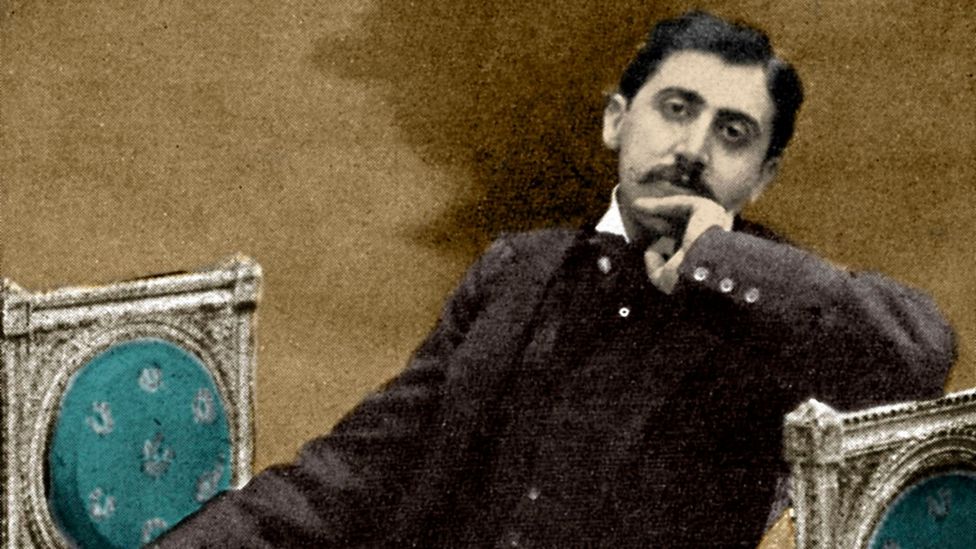
A madeleine cake dipped in tea inspires involuntary memories in Proust's novel In Search of Lost Fourth dimension (Credit: Getty Images)
For the time beingness, Villarroel is happy to stick with his notebooks. He says he once endemic a lifelogging camera and used it for a few years, but he simply institute it too arduous to go along rail of all the photos. "Sometimes that would exist fun, but sometimes information technology'd be more dull," he says. Pen and paper, combined with his Excel spreadsheet indexing his logs' contents, are still his preferred means of recording his experiences.
He estimates that he now spends at least an hour a day in full taking notes, though some of that is showtime by the gains in efficiency that have come from his improved time management. He admits in that location are some downsides to this: he tin feel frustrated when he looks back at periods that accept been specially unproductive, for case. "Only I really don't tend to be judgemental looking backwards," he adds.
Nor does he find that information technology leads him to dwell too much on painful events. "I've establish that if something bad happened which I blame myself for, looking at the notebook helps put it into context," he adds. "And so overall it tends to make me feel like I did [the best] I could." Nor have his family unit complained besides much, though he jokes that's partly considering it helps him to remember adept ideas for birthday gifts.
The author Zadie Smith has previously said that she writes to avoid "sleepwalking through life". It strikes me that Villarroel's journals are serving this purpose by making him more vividly aware of his experiences.
His original ten-twelvemonth-experiment was due to end this February, but he's decided to continue after that point. "It'south a habit that I've adopted into the whole of my life," he says. "I know information technology sounds a bit corny, but it's a way to live life a scrap more than intensely."
Source: https://www.bbc.com/worklife/article/20191202-can-lifelogging-really-help-you-live-more-intensely
0 Response to "Learning to Live Again Ken Menard"
Post a Comment